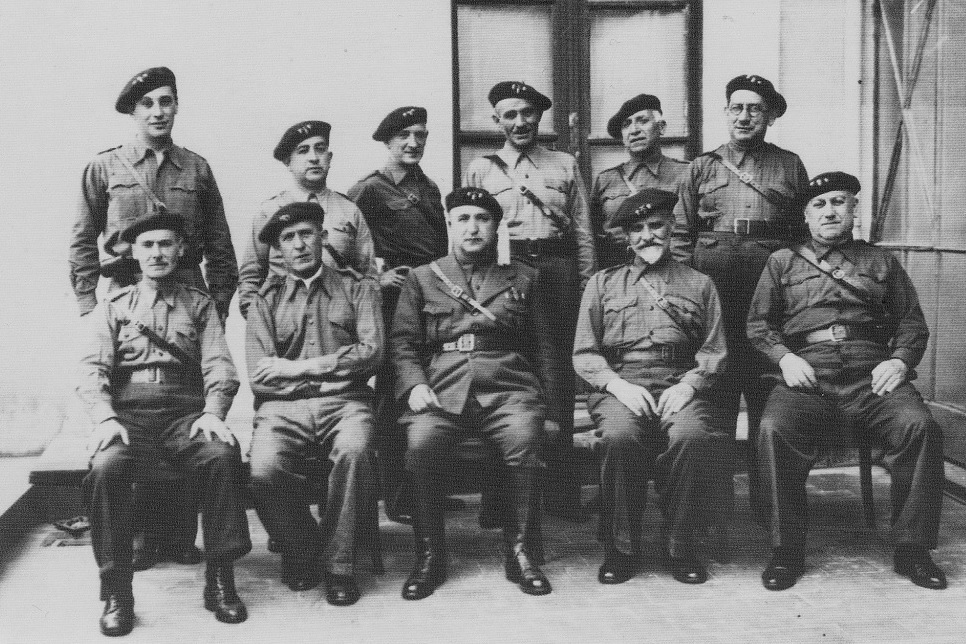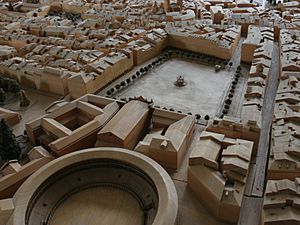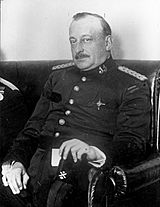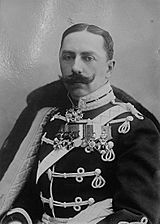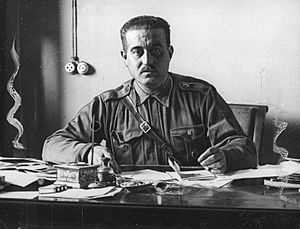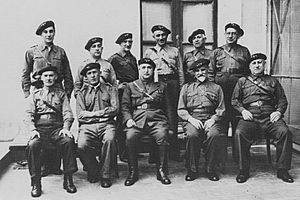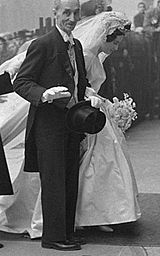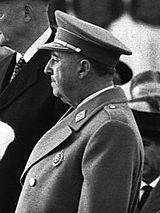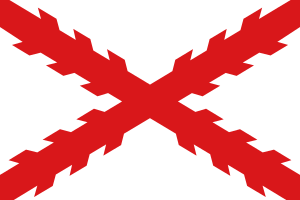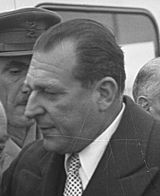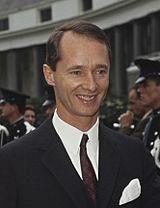Joaquín Baleztena Ascárate facts for kids
Quick facts for kids
Joaquín Baleztena Ascárate
|
|
|---|---|
|
|
|
| Born |
Joaquín Baleztena Ascárate
1883 Pamplona, Spain
|
| Died | 1978 Pamplona, Spain
|
| Nationality | Spanish |
| Occupation | lawyer |
| Known for | politician |
| Political party | Comunión Tradicionalista |
Joaquín Baleztena Ascárate (born February 25, 1883 – died June 26, 1978) was an important Spanish politician. He was part of a political group called the Carlists.
Joaquín served in the Spanish parliament, known as the Cortes, for three terms between 1919 and 1923. He also led the Carlist party in the Navarre region during two different periods: 1931–1942 and 1951–1957. He was a key Carlist leader in Spain from the late 1910s until the early 1970s. From 1937 to 1939, he was a member of the National Council of the Falange Española Tradicionalista y de las JONS, a major political group at the time.
Contents
Joaquín's Family and Early Life
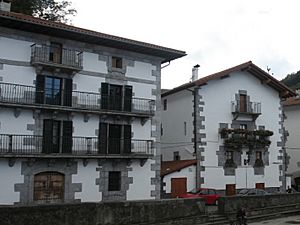
Joaquín's family came from Leitza in Navarre, a region in northern Spain. His grandfather, José Joaquín Baleztena Echeverría, was an "indiano." This means he went to places like California and Cuba to make money before returning home. He owned buildings in Leitza.
Joaquín's father, Joaquín Baleztena Muñagorri, was also an important person in Navarre. He owned land and helped start local companies. He was a city council member (called a consejal) in Pamplona and a leader in the local Carlist club. Joaquín's mother, María Dolores Ascárate Echeverría, also came from a Carlist family. Her father was an officer in the First Carlist War.
Joaquín was the second of nine children. He grew up in a very Catholic home with strong Carlist beliefs. His family was very involved in politics and local culture.
- His younger brother, Ignacio, was famous in Pamplona. He helped organize many local festivals and promoted Basque culture.
- His younger sister, Dolores, was a Carlist activist. She was also Joaquín's driver and wrote books.
- His younger brother, Pedro María Baleztena Ascarate, became a national champion in Basque pelota, a traditional sport.
Many of Joaquín's relatives were also involved in Carlist politics or public life. Joaquín became the head of the family after his father passed away in 1917. People often called Joaquín "abogado," which means "lawyer," but it's not clear where or when he studied law.
Politics After the Spanish Monarchy
Joaquín started his public career when the Carlist movement in Navarre became very strong. He followed his cousins into local politics. In the early 1900s, he was elected as a Carlist city council member in Pamplona. He was re-elected several times.
Around the same time, he joined "La Conciliación," one of the first Catholic workers' unions in Navarre. He was active in its leadership.
In 1919, the Carlist movement faced a big challenge when some leaders left the party. Joaquín stayed loyal to the Carlist king, Don Jaime. He took the place of another leader in the parliament and was elected. He was re-elected in 1920 without anyone running against him. In 1923, the Carlist king asked the party not to take part in elections, but Joaquín decided to run on his own and won.
In the early 1920s, Joaquín and his brother Ignacio worked to bring Carlists and the PNV (Basque Nationalist Party) closer together. They wanted to unite traditional Basque people against other nationalist groups. This led to the Alianza Foral (Regional Alliance), which aimed to protect traditional Basque and Navarrese laws. This alliance worked well in local elections, but it also caused some disagreements within the Carlist party in Navarre.
During the Dictatorship Years
When Miguel Primo de Rivera took power in Spain in 1923, many Navarrese Carlists welcomed him at first. However, the dictatorship soon ended Joaquín's time in parliament. The Carlist movement became less active because they couldn't hold elections or play a political role.
Carlists in Navarre focused on their traditional laws, called fueros. This soon caused problems with the dictator's centralist policies. Relations with the government got worse when Carlists refused to join the dictator's political party or his national assembly. Joaquín became less involved in politics and focused on his work as a lawyer. He worked for a local hydroelectric company.
When Primo de Rivera's dictatorship ended in 1930, Joaquín's political career started again. He helped rebuild the Carlist party in Navarre. Some sources say he became its head, appointed by Don Jaime himself. Others suggest he was just a member of the leadership.
The Second Spanish Republic
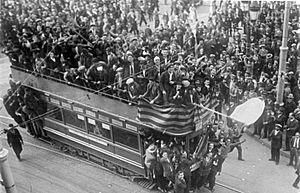
Before the 1931 elections, Joaquín worked with his brother to create an alliance between Carlists and Basque groups. This alliance was called lista católico-fuerista. Joaquín was first listed as a candidate but later withdrew, supporting others instead. Navarre was the only Spanish province where center-right parties won the elections.
In 1932, different Carlist groups joined together to form the Comunión Tradicionalista. This strengthened Joaquín's position. The new Carlist leader, Alfonso Carlos, confirmed Joaquín as the head of the Navarrese branch. The Baleztena family played a key role in opposing the new Spanish Republic. Because of this, their family home in Pamplona was set on fire by a left-wing group. Joaquín was effectively forced to leave Navarre for a while.
The alliance with the Basques ended in 1933. Carlists were unhappy that religious issues were being controlled by the central government instead of regional governments. In 1934, Manuel Fal Conde became the national leader of the Carlists. This made Navarre's position within the party a bit weaker. Fal and Baleztena had a difficult working relationship for 20 years.
By the mid-1930s, Carlism began preparing for a violent overthrow of the Republic. Fal wanted a Carlist-only uprising, but Baleztena and the Navarrese preferred to work with military leaders.
The Spanish Civil War
The period between July 1936 and April 1937 was the most important time in Baleztena's political life. His actions greatly influenced the Carlist movement and possibly the history of Spain. He was crucial in deciding how Carlists would join the military uprising and later how they would unite with Francoism.
In the summer of 1936, during talks with General Mola, Baleztena and other Navarrese leaders pushed for Carlists to join the rebellion almost without conditions. They went against Fal's more careful approach. As a result, the Carlist militia, the Requeté, joined the uprising without clear promises from the military. The Navarrese formed their own wartime group, the Navarrese War Council, which Baleztena temporarily led. This group followed its own political path.
When the Carlists faced being combined into one big party, Baleztena joined other Navarrese leaders like Rodezno. They pushed for Carlists to agree to the military's demands. They accepted Franco's ultimatum and convinced the new Carlist leader, Don Javier, to agree. This led to the Carlist party joining FET, the new unified party, without major problems.
Baleztena still had Don Javier's trust and was allowed to join the Falangist National Council. However, he soon became unhappy with Franco's new government. When Franco visited Pamplona in 1937, the Baleztena family gave him a very cold welcome. The Navarrese War Council was dissolved, and Don Javier asked Baleztena to reorganize the Carlist movement in Navarre.
Early Years of Franco's Rule
In 1939, Baleztena formed a new regional Carlist council. His goal was to keep the Carlist party independent. He worked with some leaders who cooperated with Franco's government. He succeeded in preventing the Carlist newspaper, El Pensamiento Navarro, from being taken over by Franco's propaganda. He also helped set up a Carlist cultural center and get Carlists appointed to local government jobs.
His cooperation with Fal, the national Carlist leader, remained difficult. In 1941, they disagreed on how to choose regional leaders. During the Begoña incident in 1942, the Baleztena family tried to avoid a direct conflict with the Falange and urged for calm.
Despite his efforts, Baleztena started to lose control over the Carlist movement in Navarre. The party became divided. The pro-Axis group (those who supported Germany and Italy in World War II) lost influence as the war progressed. But disagreements between those who wanted to resist Franco and those who wanted to cooperate continued. There were also arguments about who should be the Carlist king. In late 1942, Baleztena resigned as the regional party leader.
The Carlist party in Navarre continued to struggle in the late 1940s. There were riots in Pamplona in 1945, and different groups competed for local government positions. In 1951, Don Javier appointed a new regional council, and Joaquín Baleztena became the president of the Navarrese Carlists again.
Later Years Under Franco
Baleztena continued to advise Don Javier against any deals with other royal families. He strongly opposed Franco's government. In 1954, Joaquín led the Carlists to a victory against the Falangist civil governors. His difficult relationship with Fal continued. Some believe Baleztena planned to remove Fal, who was dismissed by Don Javier in 1955.
However, this change did not help the Baleztena family. Under the new leader, Valiente, the Carlist party started to cooperate more with Franco's government. Baleztena was not appointed to the new national leadership groups in 1955 and 1956. In 1956, he helped create a group called the Junta Suprema de las Regiones. This group tried to stop the party from becoming too close to Franco or another royal family.
Although his relationship with Valiente and Don Javier got worse, Baleztena was appointed to a new national executive committee in late 1956. But this was his last major role. In 1957, when a young student attacked Valiente, Baleztena refused to agree to expel the student and resigned.
Baleztena remained loyal to Don Javier and criticized the 1957 Acto de Estoril, an event where Don Javier met with Franco. In the early 1960s, when a new leader, Carlos Hugo, emerged, the Baleztena family remained cautious. In 1960, Don Javier appointed Baleztena to a new Basque-Navarrese council.
As he got older, Baleztena took less part in the power struggles within the Carlist party in the mid-1960s. His last political success was in 1970, when the Baleztena family managed to push out more progressive members from the newspaper El Pensamiento Navarro. However, this victory was short-lived, and in 1970, he was expelled from the Carlist organization, which was now controlled by the progressives.
See also
 In Spanish: Joaquín Baleztena para niños
In Spanish: Joaquín Baleztena para niños


